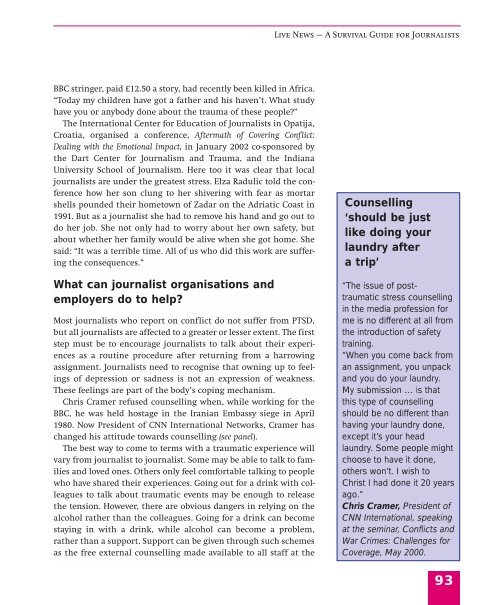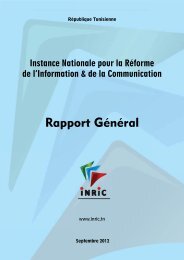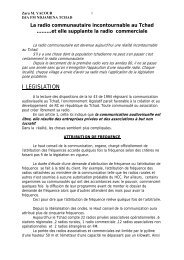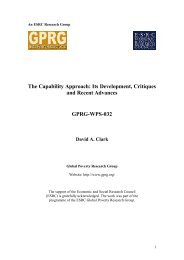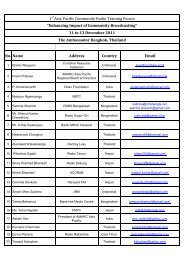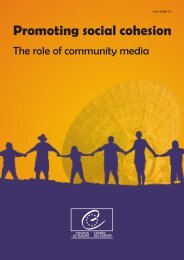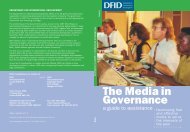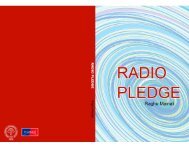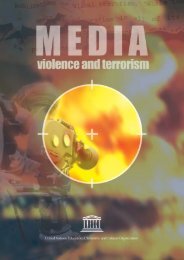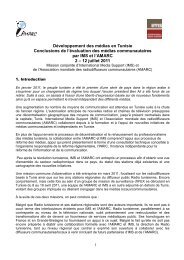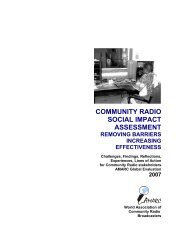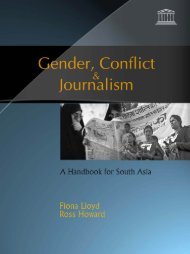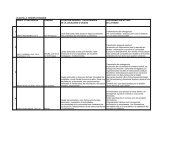Live News - A Survival Guide - International Federation of Journalists
Live News - A Survival Guide - International Federation of Journalists
Live News - A Survival Guide - International Federation of Journalists
- No tags were found...
You also want an ePaper? Increase the reach of your titles
YUMPU automatically turns print PDFs into web optimized ePapers that Google loves.
<strong>Live</strong> <strong>News</strong> — A <strong>Survival</strong> <strong>Guide</strong> for <strong>Journalists</strong>BBC stringer, paid £12.50 a story, had recently been killed in Africa.“Today my children have got a father and his haven’t. What studyhave you or anybody done about the trauma <strong>of</strong> these people?”The <strong>International</strong> Center for Education <strong>of</strong> <strong>Journalists</strong> in Opatija,Croatia, organised a conference, Aftermath <strong>of</strong> Covering Conflict:Dealing with the Emotional Impact, in January 2002 co-sponsored bythe Dart Center for Journalism and Trauma, and the IndianaUniversity School <strong>of</strong> Journalism. Here too it was clear that localjournalists are under the greatest stress. Elza Radulic told the conferencehow her son clung to her shivering with fear as mortarshells pounded their hometown <strong>of</strong> Zadar on the Adriatic Coast in1991. But as a journalist she had to remove his hand and go out todo her job. She not only had to worry about her own safety, butabout whether her family would be alive when she got home. Shesaid: “It was a terrible time. All <strong>of</strong> us who did this work are sufferingthe consequences.”What can journalist organisations andemployers do to help?Most journalists who report on conflict do not suffer from PTSD,but all journalists are affected to a greater or lesser extent. The firststep must be to encourage journalists to talk about their experiencesas a routine procedure after returning from a harrowingassignment. <strong>Journalists</strong> need to recognise that owning up to feelings<strong>of</strong> depression or sadness is not an expression <strong>of</strong> weakness.These feelings are part <strong>of</strong> the body’s coping mechanism.Chris Cramer refused counselling when, while working for theBBC, he was held hostage in the Iranian Embassy siege in April1980. Now President <strong>of</strong> CNN <strong>International</strong> Networks, Cramer haschanged his attitude towards counselling (see panel).The best way to come to terms with a traumatic experience willvary from journalist to journalist. Some may be able to talk to familiesand loved ones. Others only feel comfortable talking to peoplewho have shared their experiences. Going out for a drink with colleaguesto talk about traumatic events may be enough to releasethe tension. However, there are obvious dangers in relying on thealcohol rather than the colleagues. Going for a drink can becomestaying in with a drink, while alcohol can become a problem,rather than a support. Support can be given through such schemesas the free external counselling made available to all staff at theCounselling‘should be justlike doing yourlaundry aftera trip’“The issue <strong>of</strong> posttraumaticstress counsellingin the media pr<strong>of</strong>ession forme is no different at all fromthe introduction <strong>of</strong> safetytraining.“When you come back froman assignment, you unpackand you do your laundry.My submission … is thatthis type <strong>of</strong> counsellingshould be no different thanhaving your laundry done,except it’s your headlaundry. Some people mightchoose to have it done,others won’t. I wish toChrist I had done it 20 yearsago.”Chris Cramer, President <strong>of</strong>CNN <strong>International</strong>, speakingat the seminar, Conflicts andWar Crimes: Challenges forCoverage, May 2000.93


